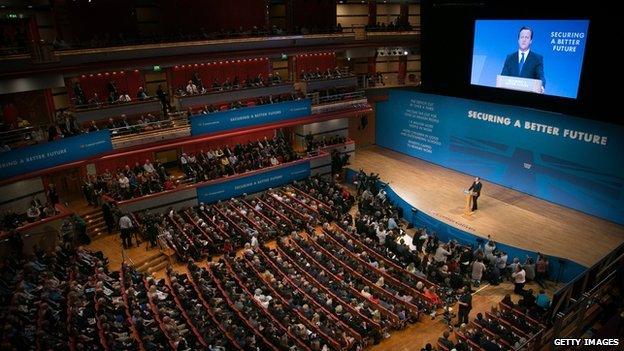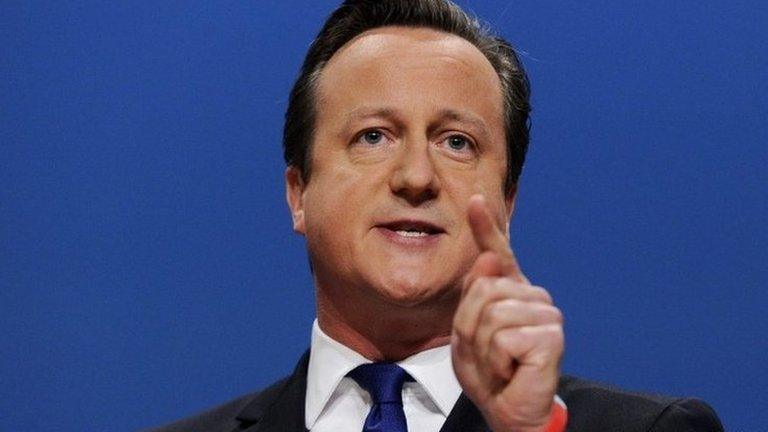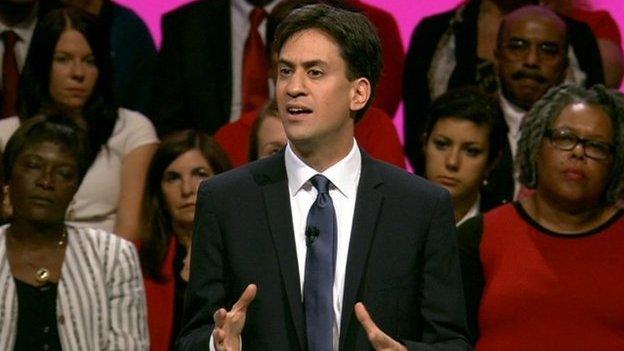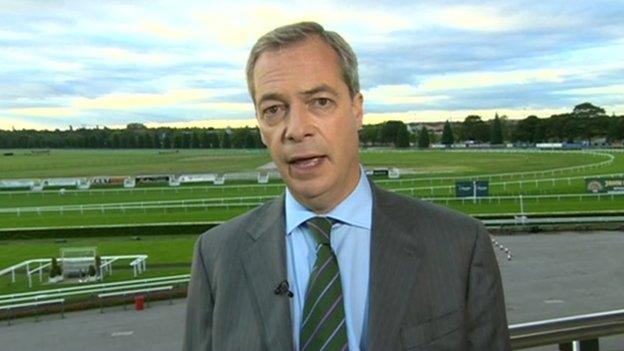Party conferences: A look at domestic policy
- Published

How have the first few party conferences shaped our knowledge of what domestic politics might look like after 2015?
Two important announcements on health and education from Labour and the Conservatives caught my eye.
Firstly, both parties propose more money for health. Labour's bigger pledge seems to cut against the party's attempts to present a more fiscally disciplined face.
At first sight, it is curious for the Tories, too. Why protect the NHS? The Conservatives already have a strategy that will entail a further round of 8 to 9% cuts in departmental spending, on top of existing plans, by 2018-19 - if they don't raise taxes.
Sparing health from the spending reductions inflicts all the pain on other departments, which will make those deep cuts harder to implement.
But neither has much choice, given their commitment to the NHS as it stands. Even in the short term, NHS spending will rise, whatever they say.
In fact the big question right now is whether the Department for Health will crash through its spending limits this year.
After years of broadly static funding, a tight situation for the health service is being exacerbated by a bigger rise in demand for health services than is normal.

So more money for health is a politically valuable campaigning point for both parties. But, in truth, they will have felt they really had few options.
Secondly, both parties are talking a big game on apprenticeships - training programmes for people in work. The Tories say they want to increase their number, delivering "three million apprenticeships" over the next parliament - an average of 600,000 a year.
That is big. About 510,000 people started an apprenticeship in 2012-13. That itself is a massive rise on 2009-10, when only 278,000 people began one.
The recent huge surge in apprenticeship starts came, in large part, as the government shut down other subsidised training routes. So lots of people who would have gone through schemes like the now defunct Train to Gain count as "apprentices" instead.
But, now, that easy growth is over. And as the rules around what is expected of apprentices and who may offer them have been toughened, growth has been spluttering. The number of apprentices has actually dropped from a high in 2011-12.
So, I suspect, reaching that three million target will require more effort, extra funding and new policy. New participating employers and employees need to be found. The extra ones will be harder to deliver than the existing ones.
Labour's plan on apprentices is longer-term - to have the number of under-25 apprentices in England rise to equal the number of young people going to university by 2025.
How many is that? Undergraduate starts for young people in 2010-11, the last year for which we have clear, useful data, were at about 320,000.
Looking at global trends, I would plan on the assumption that it will be quite a bit higher in a decade's time. So it's a big rise from the current 279,900 under-25 apprenticeships.
But Labour also wants all of those apprenticeships to be advanced programmes. Of those under-25 apprentices, only about 100,000 are at that level now. So it is a big undertaking.
That will all be expensive, and require employers to play ball as the state demands more training. In recent years, youth apprentices have also proved the hardest number to get to rise.
Labour says they can pay for it by refocusing "some of the existing spending on low-level apprenticeships currently being done by people in their 40s, 50s and 60s".

That would almost certainly mean overall apprenticeship numbers would drop. The biggest fallers would probably be the worst quality provision, too. So that might be good.
But it is hard to call. Some of those programmes get valuable - if basic - training to hard-to-reach people who missed out in their youth.
I have, of course, missed a party out that made great hay out of statements on the NHS in the past week. So what to make of UKIP's domestic policies?
Well, it is a bit early to start. A lot is still nascent. "Wait for the manifesto," I was told a lot when asking for detail and costing. Much of their policy work is starting from scratch.
Furthermore, I asked activists, spokespeople and MEPs about the red lines they would draw in any post-election negotiation with another party.
Europe was the only sacred cow, immigration was close behind, and "tax cuts" were a distant third place. Health and education were not on the list.
So - assuming that UKIP do not win an outright majority - a lot of the domestic policy issues they talk about outside those core areas is a strange sort of hypothetical.
That's why two UKIP MEPs cheerfully told me the party uses domestic policy to signal to us what sort of people they are, not to tell us what they would actually do.
They announce policy so you hear: "UKIP are pro-NHS and anti-establishment".
Still, they have fleshed out areas that really matter.
For example, Steven Woolfe MEP, UKIP's immigration spokesman, told me they would take a lot of students - though not all - out of their target to reduce net immigration to under 50,000 people a year.
Voters think UKIP are as hard as nails on migrants. So, if they say they think lots of foreign students are a good thing and aren't what people mean when they talk about migration, they take it.
This position helps Labour, because they too don't want students inside the target. In fact, only the Conservatives remain committed to keeping students within their immigration target.
And so, on policy, even as they laid into Labour at their conference, UKIP offered them a little covering fire.
- Published1 October 2014

- Published25 September 2014

- Published26 September 2014
